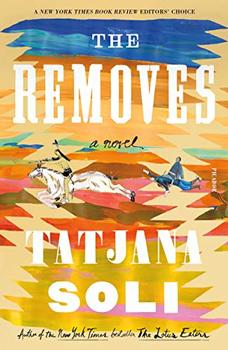Book Club Discussion Questions
In a book club? Subscribe to our Book Club Newsletter!
For supplemental discussion material see our Beyond the Book article, Sitting Bull and our BookBrowse Review of The Removes.
Please be aware that this discussion guide will contain spoilers!
Spanning the years of the first great settlement of the West,
The Removes tells the intertwining stories of fifteen-year-old Anne Cummins, frontierswoman Libbie Custer, and Libbie's husband, the Civil War hero George Armstrong Custer. When Anne survives a surprise attack on her family's homestead, she is thrust into a difficult life she never anticipated—living among the Cheyenne as both a captive and, eventually, a member of the tribe. Libbie, too, is thrown into a brutal, unexpected life when she marries Custer. They move to the territories with the U.S. Army, where Libbie is challenged daily and her worldview expanded: the pampered daughter of a small-town judge, she transforms into a daring camp follower. But when what Anne and Libbie have come to know—self-reliance, freedom, danger—is suddenly altered through tragedy and loss, they realize how indelibly shaped they are by life on the treacherous, extraordinary American plains.
With taut, suspenseful writing, Tatjana Soli tells the exhilarating stories of Libbie and Anne, who have grown like weeds into women unwilling to be restrained by the strictures governing nineteenth-century society.
The Removes
is a powerful, transporting novel about the addictive intensity and freedom of the American frontier. We hope the following questions will enhance your reading group's experience of this electrifying book.
Questions and Topics for Discussion
- The book begins with an epigraph by Crazy Horse that says, "A very great vision is needed and
the man who has it must follow it ..." Does anyone in the novel show great vision? How does
this quote set the tone for the story to come?
- The narration moves back and forth between three characters—Anne, Libbie, and Custer. How does this affect your experience of the story? How does this affect your knowledge of that time
in history?
- Whose story do you empathize with the most? Which character do you like the most? Which one
surprised you the most?
- Libbie makes a bold decision for a young woman of her time and station, marrying a military man.
Do you think it was foolish? Did she come to regret it? What were the benefits of the unusual life
she ended up living?
- George Armstrong Custer was one of the youngest Civil War heroes in the nation. Do you sympathize with his difficulty adjusting to an obscure military life postwar? What do you think of his reinvention of himself as an Indian fighter?
- Libbie is shocked by the inhumanity she glimpses during the Civil War. The Indian tribe that Anne lives with suffers inhumanity at the hands of the U.S. military. What are the parallels between the two? What are the differences?
- Golden Buffalo tries to help his tribe by learning the ways of the white culture that is overtaking his people's world. On page 141, he has the following realization: "He saw his people's futility in fighting such numbers, such rapaciousness. It was as useless as killing off coyotes. More would always come." Do you think he was wise to try to learn the ways of his enemies? Foolish? Is there any way he could have done better to help his people?
- When Golden Buffalo's chief asks him what kind of a man Custer is, he answers, "He is a warrior. He has the heart of an Indian." Were you surprised by the Indians' respect for Custer as a warrior? Did this change your perception of him?
- On the surface, Anne's and Libbie's stories are totally different. How are their experiences of the
frontier similar?
- Chief Black Kettle was attacked at the Sand Creek Massacre, but he remained on the path of peace.
He was attacked again and killed at the Washita Massacre by Custer. What were his choices? After the Washita Massacre, were you surprised that public opinion began to criticize the army's
actions?
- On the train trip to Dakota, Custer defends his black cook's right to eat at the same table as him and his soldiers, although it is clear he does this more for expediency than conviction. What do
you think of his character?
- On page 253, during the Dakota blizzard, Libbie thinks that she "had entered the most terrible kind of dream, the kind that was real and was your life and you could not awake from." In what ways is this true for all three main characters? Libbie overcomes her panic and takes charge, saving both soldiers' lives and a horse's life. Do you admire her actions? What would you do under such extreme conditions?
- In what ways, large and small, does Neha affect Anne's experience of captivity? How does their relationship change after being rescued?
- Anne tells her aunt Lydia that she misses her children. Were you surprised by Lydia's reaction and her advice?
- At the time of the Battle of Little Bighorn, the death of Custer and his men was considered a national tragedy. Compare attitudes about Custer then and today. In what ways was Custer complicit with our government's treatment of American Indians? In what ways was he a product of his time?
- The Removes is filled with examples of human nature at its best and worst. How does the theme of good and evil play out in each character? In the story as a whole? In American history during the frontier period?
Unless otherwise stated, this discussion guide is reprinted with the permission of Picador.
Any page references refer to a USA edition of the book, usually the trade paperback version, and may vary in other editions.
